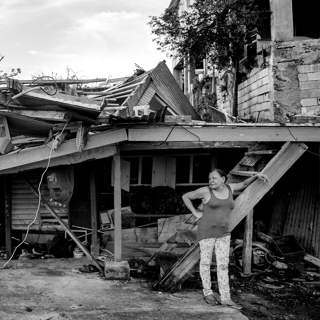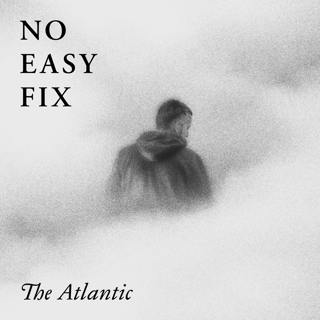
Who Leaves, Who Stays
When Taliban forces seized control of Kabul last year, many Afghans faced life-changing choices. One family's decision led to a harrowing journey for a young woman and her sister. Related Links Bushra Seddique wrote about her escape from the Taliban for the September 2022 issue And she's reported on "What Afghans Want the Rest of the World to Know" This episode was hosted by Claudine Ebeid and produced by Kevin Townsend with editing from Theo Balcomb. Art by Sally Deng. Fact check by Stephanie Hayes. The managing editor is Andrea Valdez and the executive editor for The Atlantic is Adrienne LaFrance Learn more about your ad choices. Visit megaphone.fm/adchoices
20 Okt 202240min

What Puerto Rico Needs Most
Can an island that keeps getting pummeled by hurricanes ever be free? Executive Producer Claudine Ebeid speaks with Atlantic contributors Jaquira Díaz and Robinson Meyer about what the island's status as a commonwealth means for recovery and modernizing its power grid. Background Reading Why Jaquira Díaz believes “Puerto Rico Needs Independence, Not Statehood.” Imani Perry on natural disasters and colonialism Why Puerto Rico's problems go beyond its debt crisis This episode was hosted by Claudine Ebeid, and produced by A.C. Valdez with help from Kevin Townsend. Fact check by Isabel Cristo. The managing editor is Andrea Valdez and the executive editor for The Atlantic is Adrienne LaFrance Learn more about your ad choices. Visit megaphone.fm/adchoices
6 Okt 202226min

The New Kabul
Atlantic fellow Bushra Seddique tells the story of the moment everything changed for her in Kabul, and The Atlantic's Editor-in-Chief Jeffrey Goldberg talks to retired General David Petraeus about the war in Afghanistan and the mistakes made both during his time in command and as the U.S. military withdrew. Background reading: Here is how Bushra Seddique escaped Aghanistan. David Petraeus believes there was another path the U.S. could have taken. A marine and an army veteran make a case that Afghanistan was lost long before the U.S. left. Show credits: in this episode you heard music from Ahmad Zahir and news tape from Al Jazeera. Learn more about your ad choices. Visit megaphone.fm/adchoices
23 Sep 202230min

Zelensky is Everywhere
The Atlantic’s editor in chief Jeffrey Goldberg and staff writer Anne Applebaum traveled to Kyiv in April to meet Ukrainian President Volodymyr Zelensky. Their wide-ranging conversation with Zelensky is a window into how he is living, what shapes his thinking, and what it looks like when an unlikely political figure like Zelensky goes from “Larry David to Winston Churchill overnight,” as Goldberg put it. Also: The October 2022 issue of The Atlantic magazine focuses on Ukraine. Read Anne Applebaum's story here. Learn more about your ad choices. Visit megaphone.fm/adchoices
8 Sep 202221min

Caitlin Dickerson on family separation
The Atlantic's editor in chief Jeffrey Goldberg talks with staff writer Caitlin Dickerson about her recent piece, "An American Catastrophe," a comprehensive investigation of the Trump administration’s policy of separating migrant children from their families. Learn more about your ad choices. Visit megaphone.fm/adchoices
22 Aug 202240min

Laws and Rights After Roe
The Atlantic's Executive Editor Adrienne LaFrance discusses a post-Roe America with two contributing writers. Legal historian Mary Ziegler and constitutional law scholar David French answer questions about what happens now that Roe v. Wade has been overturned. How will abortion bans be enforced? What will come of the legal and legislative battle moving to the states? And what other rights could the Court revoke? This conversation was recorded as part of an Atlantic live event. Learn more about live events and sign up to join at theatlantic.com/newsletters. Learn more about your ad choices. Visit megaphone.fm/adchoices
30 Juni 202228min

The Future of Roe
This week, Politico published a leaked draft opinion, written by Justice Samuel Alito, in the case of Dobbs v. Jackson Women's Health Organization. Claudine Ebeid, Executive Producer of podcasts at The Atlantic, discusses the reactions of three Atlantic contributors. Molly Jong-Fast’s most recent article is “My Mother Was Wrong About Roe v. Wade.” She also writes the newsletter Wait, What? Mary Ziegler’s is “The Conservatives Aren’t Just Ending Roe, They’re Delighting In It” and she has a forthcoming book Dollars for Life: The Anti-Abortion Movement and the Fall of the Republican Establishment. David French’s most recent article is “What Alito’s Opinion Got Right,” he writes the newsletter The Third Rail. This episode of Radio Atlantic was produced by Claudine Ebeid, A.C. Valdez, and Kevin Townsend, thanks as well to executive editor Adrienne LaFrance. We used tape from C-SPAN, Igor Volsky, Willy Lowry, WSB-TV, and BBC. Learn more about your ad choices. Visit megaphone.fm/adchoices
7 Maj 202250min

Barack Obama on Disinformation and The Future of Democracy
Disinformation is the story of our age. We see it used as a tactic of war and to further embolden autocrats.. The very tools that once helped pro-democracy movements are now being used to disseminate falsehoods—misleading the public and threatening the strength of democracies around the globe. Former President Barack Obama and editor in chief Jeffrey Goldberg talk about disinformation—how to define it, how to combat it, why it threatens democratic stability around the world, and how future generations can uphold truth. Learn more about your ad choices. Visit megaphone.fm/adchoices
7 Apr 20221h 6min






















